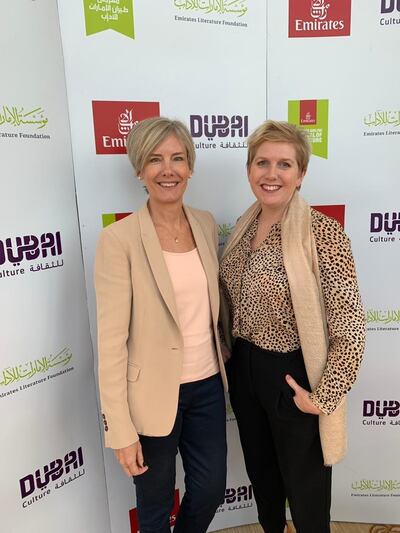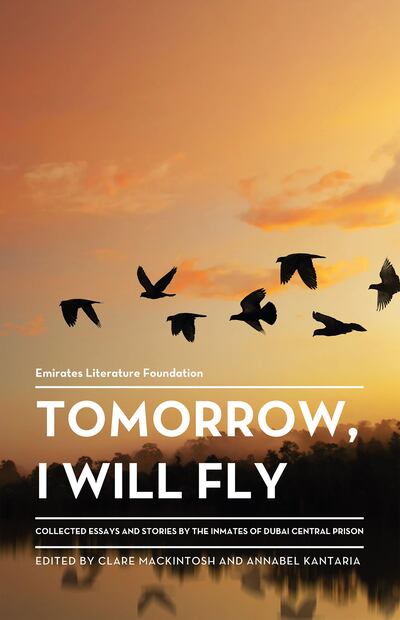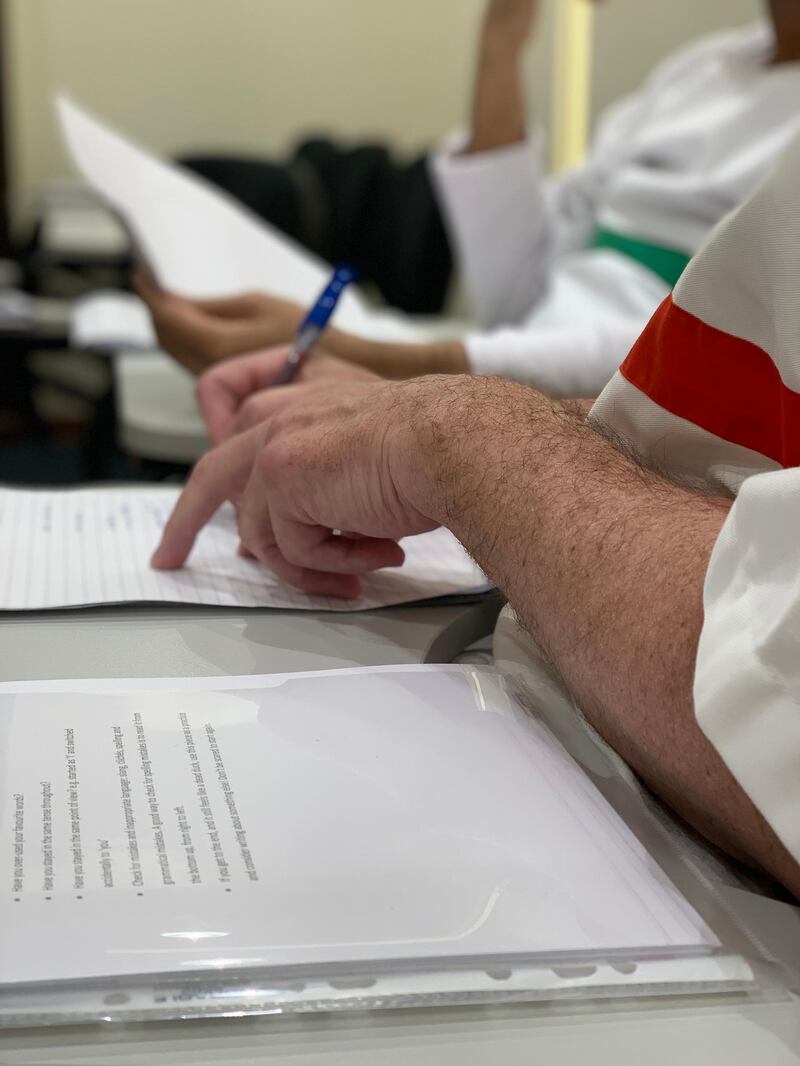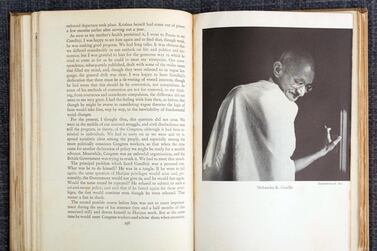Winnie grew up in a remote village in Uganda without electricity. She knew little of the outside world, until she decided to leave her homeland in search of work, for a better life for her family.
Her family were excited for her first trip on a plane; accompanying her from the village to the airport. As her plane took off, they gathered on the airport's perimeter with a picnic.
We don't know when or how Winnie's story went awry – we aren't privy to that information. What we do know is that Winnie is now serving a sentence in the female prison at Dubai Central Jail.
It is Winnie's story that provided the title for a groundbreaking book written by Dubai prisoners. But this is only one story that forms a larger picture of hopes, aspirations and, ultimately, freedom.
Tomorrow, I Will Fly is the culmination of a two-year collaboration between Dubai Police and the Emirates Literature Foundation, spearheaded by authors Clare Mackintosh (I Know You) and Annabel Kantaria (After The End).
Kantaria, who lives in Dubai, and Mackintosh, from the UK, first toured the prisons during the 2019 Emirates Airline Festival of Literature. Isobel Abulhoul, the chief executive and trustee of the Emirates Literature Foundation, had for years been working with the police and prisons to organise regular visits from local and international authors, who talked to inmates about books and the process of writing. But Kantaria and Mackintosh wanted to do more.
"I was absolutely blown away by how hungry these ladies were for information on writing," Kantaria tells The National.
"I came away thinking about what else could we do for them?"
The authors came up with the idea of a workshop series and Abulhoul "loved the idea", believing it was probably one of the first such initiatives in the Arab world.
"Literature has been one of the great joys in my life," Abulhoul says. "We know that engaging with books has so many benefits, including teaching us how to process our emotions, the things that happen to us, and how to find a better path. This is true for everyone, irrespective of age, nationality and status."

What came to fruition was a week-long writing workshop held within the prisons; Kantaria working with the women, and Mackintosh with the men. The end product would be publishing a book, with the theme of "tomorrow" – especially fitting as not only is it the theme of this year's literature festival, which will be held next month, but it also provided an outlet for inmates to share their thoughts on what they would do after they were released.
Mackintosh, a former police officer, was well-versed in the workings of the justice system back home, but she admits experiencing it in the UAE was "very different".
"I had concerns," Mackintosh says. "I wondered if there would be a reluctance to have unfettered access. We didn't know if it would work."
But it did. In the end, Kantaria worked with 15 women, and Mackintosh with 12 men. And while the authors worked closely with each and every person in their class, they stuck to one rule: never ask why anyone arrived at their fate in prison.
Kantaria recalls being surprised her class was "massively oversubscribed", as the female inmates were so keen to try out writing, or learn a new skill. Several among them fancied themselves as prospective authors after their release.
"I was very nervous when I first went in. But I relaxed really quickly because they were so keen to have me there," Kantaria says. "It was really eye-opening realising how different every single person in that room was and seeing how they've come from different places."
Each day was a full schedule of workshops, with class from 9am to 5pm. Some of the inmates wrote fiction stories, some focused on philosophy and some wrote about life before their prison terms.
For Mackintosh, working with men provided a unique set of challenges. Most had not written creatively before, though there was a performance poet, and some had written academic papers but found it "more challenging to free themselves creatively".
“On the first day, Annabel and I met to go over the day and I thought we really had an uphill task here, with the range of abilities and backgrounds, and I worried the project was just too big,” she says. “But it actually just boiled down to trust. And spending time to trust me and trust each other.”
If there were any concerns about how committed each of the inmates were to the workshops, they were soon alleviated. "On about the third morning, I walked in and had a pile of hand-written manuscripts," Kantaria says. "They just devoured anything that I could say to them.
"One woman wrote a story to her daughter who was born in jail. She's never known her life outside. Her mum tells her stories about the outside world and her daughter thinks they're fairy stories."
As well as teaching others the ins and outs of creative writing, Kantaria says she learnt a lot herself, especially of the intricacies of life inside the prison walls. There are nurseries for babies born within the prison, as well as amenities such as a ladies' boutique and mini shop. Women can earn e-money, with which they can treat themselves to certain things.
Kantaria says life in prison isn't has hopeless as people would think. "On the last day they started showing me things they made in their spare time, like tote bags from the labels off water bottles. One of them was like something you would buy in Mall of the Emirates, it was so nice. A couple of them brought out sketchbooks and their drawings blew my head off."
Kantaria also says it was heartening to see the interactions between the director of Dubai Women's Prison, Colonel Jamila Khalifa Al Zaabi, and the inmates. The author says Al Zaabi would often come into sessions and it was clear she not only had a great relationship with the prisoners – "she was their mother hen ... she would blow them kisses from the front of the room," Kantaria says – but they respected her, too.
“It was totally emotionally draining when I left each day. I felt so guilty, because they couldn’t leave,” Kantaria says. “We did end up bonding quite a lot – they were giving me fashion advice. I asked them what foods they missed, and so one day I bought them a box of doughnuts.”
Mackintosh's male participants were made up of a broad array of nationalities and ages, as well as abilities. And despite her policing background, she describes her experience in the UAE "asking a group of strangers to share their innermost concerns and feelings with each other" as "one of the most profound experiences I've had as a writer or a police officer".
"I didn't know what it was going to do to me if I let myself feel," Mackintosh says. "But there was a piece about the first moment a prisoner sees his wife again after he was released. And it made me cry."
Both authors say they hope the workshops will become a more permanent fixture for inmates. But first, they will be celebrating the release of Tomorrow, I Will Fly.

The official launch will take place at the Emirates Airline Festival of Literature on Thursday, February 6. There will also be a separate launch, inside the prisons, on the same day.
“They were all just so excited to think they were going to become published authors,” Kantaria says. “They were really wanting to give hope to other prisoners in the same situation and they were excited to think that their families could read their stories. They were really happy to be given a voice and they were very touched that people outside cared about them.”







